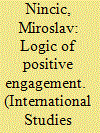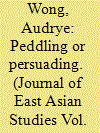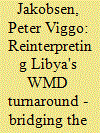| Srl | Item |
| 1 |
ID:
075007


|
|
|
|
|
| Publication |
2006.
|
| Summary/Abstract |
This article is intended to offset, partially at least, the lopsided stress placed by international relations scholarship on punitive pressures, at the expense of positive inducements, as tools for bringing renegade regimes into compliance with internationally accepted norms of behavior. I discuss the focus on punishment as a tool of foreign policy and the reasons why this bias has provided disappointing results. Using a parallel theoretical framework, I then discuss the forms that inducements can assume and the circumstances encouraging their success. The hypotheses thus derived are applied to a number of specific policy challenges. The bottom line is that inducements can, at times, produce a direct quid pro quo from the target regime and, occasionally, can modify that regime's basic motivations, so that both punishments and rewards become less necessary. In any case, positive engagement is most effective when regime's position is being challenged from within.
|
|
|
|
|
|
|
|
|
|
|
|
|
|
|
|
| 2 |
ID:
181842


|
|
|
|
|
| Summary/Abstract |
With the globalization of Chinese capital, economic statecraft has become an increasingly prominent component of China's foreign policy. In this article, I examine China's use of economic inducements in developed democracies, a topic of growing concern for policymakers, focusing on the case of Australia. I show how Beijing's attempts to coopt public voices and influence Australia's foreign policy using non-transparent political donations and academic funding generated a strong backlash. At the same time, economic interdependence has provided a buffering effect, with key domestic actors in Australia advocating for cooperative relations, although this effect can in turn be limited by Beijing's coercive economic tactics. My findings underline the reputational costs of certain approaches to economic statecraft, the value of building supportive coalitions, and the challenges faced by China's authoritarian state capitalist model. They also highlight the impacts of globalized Chinese capital in developed democracies, including the resilience and vulnerabilities inherent in democratic political processes.
|
|
|
|
|
|
|
|
|
|
|
|
|
|
|
|
| 3 |
ID:
114959


|
|
|
|
|
| Publication |
2012.
|
| Summary/Abstract |
The dominant explanations of Libya's nuclear reversal in 2003 privilege either coercion or carrots treating these instruments as alternatives. Indoing so they ignore that it took a combination of coercion, carrots and confidence-building to turn Libya around. This article demonstrates this by developing and deploying a theoretical framework that integrates these three instruments into a more coherent and convincing explanation of the case. It highlights that analysts and policy-makers would do well to focus more on how different policy tools can be used in combination to achieve desired outcomes than on how individual tools can be employed with decisive effects. It also demonstrates that the Libya success will be hard to replicate.
|
|
|
|
|
|
|
|
|
|
|
|
|
|
|
|